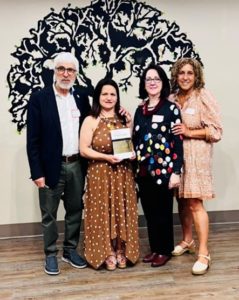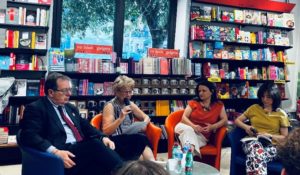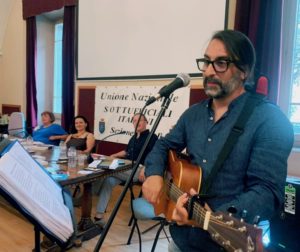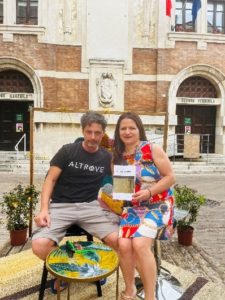By Anna Ciardullo Villapiana
“Narrarsi Altrove" is a bilingual edition poetic study by Anna Ciardullo Villapiana, edited by Professor Gabriel Niccoli, published by Rubbettino Editions, Catanzaro, 2023, in the Italian Diaspora Studies series.
The poetic study examines first-, second-, and third-generation Italians residing in the Waterloo and Wellington Ontario areas, through a series of interviews in which the stories of objects, particularly dear to their owners because of their affective and identity value, are introduced and documented.
The object becomes a pretext for analysis, allowing the holder to better tell his or her own story.
“It is in this subject-object dialogue that one can best understand the natural role of the diasporic object as guardian of memory and sustainer of identity, a role essential to the survival of both community and its cultural or familial tradition. In this sense, the object helps us to remain ourselves altrove, “elsewhere”, keeping our identity safe from the risk of disintegrating into the ghastly forgetfulness of who we really are. Its aim is to preserve and reflect. When the object beckons us to listen to our life’s story, to our inner sense of identity, it starts with the first word in the Rule of Saint Benedict: “obsculta” (“listen'').”. (cit. Prof. Gabriel Niccoli)
Protagonists of the poetic narrative are, therefore, objects, heirlooms, and relics that immigrants brought with them during their journey from Italy to Canada. Musical instruments, linens, postcards, paintings, keys, rusty nails, sewing machines, daggers, pruning shears, horseshoes and other objects that have been preserved for generations in memory of their keepers, often children and grandchildren of Italian immigrants.
Gabriel Niccoli (professor emeritus at the University of Waterloo), Stella Paola (high school teacher) and I, (teacher and poet) interviewed ninety people and then chose a little more than half of them. Then I wrote prose and poetry to complete the study, with Gabriel and Stella translating poetry and prose respectively into English.
The project was conceived and developed with the support and under the auspices of ICAP (Italian Canadian Archives Project), a national network that aims to preserve the past and present contributions of Italians in Canada through a series of studies across the country.
After collecting and documenting the photos of the objects, we listened to the personal stories of their owners, and for each of them I, as mentioned, wrote a poem that aims to capture the essence of the migratory gesture, the reason for the attachment to that particular object, and its symbolic value.
The poems are introduced by biographical notes through a narrative that includes myths and legends of the interviewees' places of origin, as well as literary and anthropological references.
Watch the project trailer here [https://youtu.be/S-3FUUT-x1c?si=11a5PcXOOa0G_esE]
Overall, the volume, as stated in the afterword by Margherita Ganeri (professor of Italian Literature at Università della Calabria and director of Rubbettino’s Italian Diaspora Studies series):
“Si rivolge a un largo pubblico di lettori, non solo italo-canadesi e italiani, a cui offre la possibilità di immergersi nel flusso delle narrazioni intrecciate e dialoganti, lasciandosi sedurre dalla tensione creativa che le permea.”.
The project was very well received by the Italian Canadian Community in North America.
When the Hon. Joe Volpe, director of the Toronto newspaper Corriere Canadese, came to know of its contents, he offered a weekly space in his newspaper divulging the stories and photos both of the objects and of the interviewees.
The project was also discussed in Italian schools, through zoom meetings, with high school students and teachers in different cities.
On May 6th, 2023, the contents of Narrarsi Altrove were discussed in the Librissimi book festival, in the panel “From Biography to Legacy: Why we Tell Life Stories”, with great interest on the part of an attentive public who asked a lot of questions and shared their own stories.

(G. Niccoli, Anna C. Villapiana, Gabriella Colussi Arthur, Stella Paola. St. Jerome’s University)
On June 9th, 2023, the official book launch took place at St Jerome’s University, with an audience of academics, ICAP members, ComItEs of Toronto and community members, not only of Italian origin. Daniela Sanzone, a journalist from OMNI tv was also present and dedicated a story on the news to the project.
See the OMNI news story here [https://www.omnitv.ca/video/narrarsi-altrove-un-libro-sugli-oggetti-della-memoria-e-dellidentita/]
In the second half of June, Narrarsi Altrove was launched in Italy, starting in the city of Caserta. I was invited to open a dialogue with local poetess Maria Stella Eisemberg and teacher Daniela Borrelli. The organizers involved authorities, artists, and the students at School of Acting of Liceo Giannone. After reading and interpreting the poems they asked questions, being very curious about the life of Italians in Canada and the process of interview and research behind the pages of our poetic study.

(Enzo Batarra, M. Stella Eisemberg, Anna C. Villapiana, Daniela Borrelli. Libreria Giunti, Caserta)
On June 22nd, 2023, I was in Forli for an event of music and poetry. The organizers involved authorities, and different members of local cultural associations. My dialogue with organizers Mirna Milandri and Roberto Toscano was alternated with Italian songs accurately chosen to match the topic of the poems read and interpreted by Italian songwriter Gianluca Lalli. The public was very enthusiastic and participated with great interest.

(Mirna Milandri, Anna C. Villapiana, Roberto Toscano, Gianluca Lalli. Forlì)
Urbino followed, a beautiful city in the hills of Marche, where the Festival of Arts was held and I had the opportunity to share our work with a crowded group of artists interested in various topics and passionately engaged in discussions, sharing their own experiences, comparing the phenomenon of emigration and immigration, and talking about the challenges Italians are currently facing in welcoming newcomers and having to deal with new waves of cultures and vice versa, pointing to the challenges newcomers are facing in order to feel accepted into Italian communities. It was interesting to notice that everyone in the room had an object particularly dear that they wanted to talk about.

(Gabriele Gago, violinist, and Anna C. Villapiana. Urbino).
Diasporic objects in Narrarsi Altrove serve, as Maria Stella Eisemberg stated, as “viaticum”, the supply or provision that emigrants undertaking a journey need to bring with them, to find comfort in them, to remember their place of origin, to exorcize their inevitable fears, to feed their hope for a better future. And a “viaticum” in its religious term, I would add, as a rite of passage for a new life.
The last stop of the book tour was in Cosenza, where Professor Mirko Casagranda of Università della Calabria, in collaboration with Domenic Cusmano, director of Accenti Magazine, held a conference with the participation, among others, of academics and members of the Association of Italian Canadian Writers (AICW). Being mostly Italian Canadians in attendance, the discussions following the book launch were rich in emotion, the public related enthusiastically to me, sharing their points of view and suggesting a continuation of this journey, adding new stories, and publishing a second volume, thus creating a poetic space that goes beyond the Waterloo-Wellington area and reaching out to the vast community of Italians in the world.
The purpose of the book and of the book tour in Italy, the latter rendered possible thanks to the generous grant from the Elia Chair, for which I am very grateful, was to bring into schools, libraries, cultural associations, universities and plazas a message from overseas, instigating curiosity and awareness of the common feelings hiding behind the melancholic and happy masks of immigrants who are trying to escape oblivion and connect to their roots.
The book tour was also for me both a physical and a literary journey through places, memories, and heirlooms that evoked, as with the Proustian madeleine, the scent, and the taste of my past while awakening the sound of my Italian childhood, of my youth.
” Often viewed as the voice of memory, or even as the material place of memory, within the silence of diaspora, the diasporic object is forged by our poet into a cultural icon capable of preserving and rewriting the historical consciousness of its custodian’s community.”. (cit. G. Niccoli)

